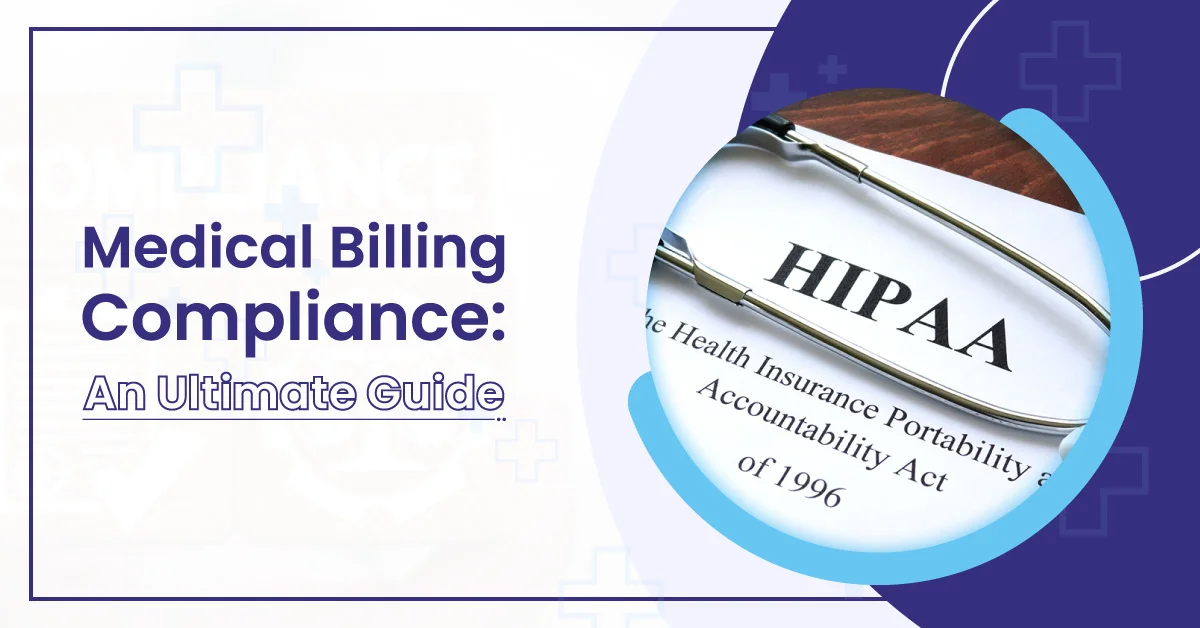Medical billing compliance is not just an optional procedure; it’s a necessity. For healthcare providers, practices, doctors, and medical professionals across various specialties, the stakes are high regarding compliance. This ultimate guide will delve into the intricacies of medical billing compliance, providing the essential knowledge you need to navigate this complex landscape successfully.
What is Medical Billing Compliance?
Medical billing compliance refers to accurately and legally charging for medical services rendered. This process entails adhering to all relevant federal and state laws and guidelines established by Medicare, Medicaid, and private insurance companies. It is the cornerstone of any healthcare practice’s financial health, impacting revenue, patient satisfaction, and legal standing.
These guidelines are extensive, encompassing various areas such as proper medical code use, claim submission, patient confidentiality, and more. Medical billing compliance includes following regulations set forth by entities such as:
Federal and State Laws
These laws govern various aspects of healthcare billing, including fraud and abuse, privacy and security of patient information, and more.
Centers for Medicare & Medicaid Services (CMS)
CMS sets specific guidelines for billing Medicare and Medicaid patients. These include regulations on medical necessity, accurate coding, and proper documentation.
Health Insurance Portability and Accountability Act (HIPAA)
HIPAA regulations protect patient privacy and secure electronic health information. Compliance with HIPAA is crucial to avoid penalties and ensure patient trust.
Private Insurance Companies
Each insurance provider may have their unique billing guidelines and requirements. It’s essential to understand and comply with these to ensure correct reimbursement.
Non-compliance with medical billing regulations can lead to severe consequences, including audits, penalties, claim denials, damage to the practice’s reputation, and even legal action. Therefore, understanding and implementing medical billing compliance is essential for any healthcare practice’s financial health and legal integrity.
Importance of Medical Billing Compliance
Medical billing compliance is paramount in the healthcare industry, playing a crucial role in the functioning and sustainability of any healthcare practice. This importance is underlined by the severe consequences that can arise from non-compliance, which extend beyond financial penalties to potentially irreversible damage to a practice’s reputation and operations.
Financial Implications
Non-compliance with medical billing regulations can lead to substantial financial penalties. In 2022, healthcare fraud judgments and settlements accounted for over $3 billion, as reported by the Office of Inspector General (OIG). These financial penalties reduce a practice’s revenue and destabilize its financial standing, with long-term implications for its viability.
Legal Consequences
Consequences of non-compliance can be severe and include civil and criminal penalties. Practices can be excluded from participating in federal health programs, significantly affecting their patient base and revenue. Individuals involved in fraudulent billing practices can face imprisonment in more severe cases.
Reputational Damage
In the healthcare industry, trust and reputation are paramount. When a practice is non-compliant, it risks significant reputational damage. This can erode patients’ trust, which may lead to reduced patient numbers. Such an occurrence could be particularly devastating in this sector.
Operational Disruptions
Investigations into non-compliance can cause significant disruptions to a practice’s operations. Staff members may need to be diverted from their usual tasks to assist with investigations or audits, affecting productivity and service provision. In severe cases, a practice may even need to cease operations temporarily.
Compliance as a Commitment to Quality Care
Maintaining medical billing compliance demonstrates a practice’s commitment to providing quality care. Accurate billing practices reflect respect for healthcare rules and regulations and a commitment to upholding ethical standards. This not only helps avoid the negative consequences of non-compliance but also contributes to establishing a reputable and successful practice.
The importance of medical billing compliance cannot be overstated. It is critical to a healthcare practice’s operations, impacting financial stability, legal standing, reputation, and operational efficiency. Far from being a bureaucratic formality, compliance is a fundamental aspect of the commitment to providing quality, ethical healthcare.
Vital Elements of Medical Billing Compliance
Accurate Coding
Accuracy in medical coding is the cornerstone of compliance. Every service provided must be accurately coded using the most current version of the relevant coding systems – Current Procedural Terminology (CPT), International Classification of Diseases (ICD), and Healthcare Common Procedure Coding System (HCPCS). These codes directly influence the reimbursements received, so inaccuracies can lead to over or under-billing, resulting in severe penalties.
Thorough Documentation
Every service provided must be supported by thorough, accurate documentation. The medical record should support the necessity and appropriateness of the care provided and billed. Documentation errors can lead to claim denials, audits, and potential legal action.
Regular Audits
Routine internal and external audits are essential to a robust compliance program. These audits can uncover coding errors, documentation shortcomings, or other issues that might lead to non-compliance. Addressing these issues can help prevent costly penalties and protect your practice’s reputation.
Compliance Training
All staff members involved in the billing process should receive comprehensive and ongoing compliance training. This training should cover accurate coding, proper documentation, understanding of the billing process, and knowledge of the relevant laws and regulations, such as the False Claims Act and the Anti-Kickback Statute.
Ethical and Legal Standards
Maintaining high ethical and legal standards is crucial. This includes adhering to the Health Insurance Portability and Accountability Act (HIPAA) standards, ensuring patient privacy, and avoiding fraudulent practices like upcoding, unbundling, or duplicate billing.
Medical billing compliance requires a multi-faceted approach encompassing accurate coding, comprehensive documentation, regular audits, continuous training, a dedicated compliance team, and adherence to the highest ethical and legal standards. Healthcare providers can maintain a compliant, efficient, and profitable practice by focusing on these critical elements.
Navigating Compliance Challenges
Staying Updated
One of the most significant challenges in medical billing compliance is the constant evolution of billing codes, laws, and regulations. For instance, the transition from ICD-9 to ICD-10 increased the number of codes from approximately 13,000 to over 140,000. Staying updated with these changes is paramount. Regular training sessions, subscriptions to industry publications, and alerts from regulatory bodies can help keep your practice up-to-date.
Technology Integration
Embracing technology can be a game-changer in managing compliance challenges. Advanced solutions such as Electronic Health Records (EHRs), practice management systems, and AI-powered coding tools can help streamline the billing process, reduce errors, and ensure compliance. However, selecting the right technology and training your staff to use it effectively can be significant.
Dealing with Payer Specifics
Different payers often have different rules. Medicare, Medicaid, and private insurance companies may have unique requirements for claim submissions and reimbursements. Understanding and managing these differences can be challenging, but compliance is crucial.
Maintaining Patient Confidentiality
HIPAA requires healthcare providers to ensure the confidentiality and security of patient information. As more patient data is stored and transmitted digitally, the risk of data breaches increases. Ensuring robust data security measures is essential but can be a complex and ongoing challenge.
Staff Turnover
High staff turnover rates in the healthcare industry can hinder maintaining consistent compliance. Frequent personnel changes can lead to a lack of continuity and understanding of compliance procedures. Continuous training and a solid onboarding process can help mitigate this issue.
Resource Limitations
Smaller practices might struggle with limited resources for managing compliance. Hiring dedicated compliance officers or investing in expensive technologies may not always be feasible. In such cases, outsourcing medical billing or using cloud-based compliance solutions can be cost-effective alternatives.
Navigating medical billing compliance challenges requires staying informed about regulatory changes, leveraging technology, understanding payer specifics, maintaining patient confidentiality, managing staff turnover, and creatively dealing with resource limitations. By effectively addressing these challenges, practices can ensure their medical billing processes are compliant, efficient, and profitable.
Conclusion
Medical billing compliance is a crucial aspect of healthcare that significantly impacts a practice’s success. This involves staying abreast of coding updates, ensuring thorough documentation, conducting routine audits, effectively utilizing technology, providing ongoing training, understanding payer policies, and maintaining patient confidentiality. Healthcare providers can significantly enhance compliance by focusing on these critical areas, ultimately leading to a more efficient, ethical, and profitable practice. In the healthcare landscape, consistent commitment to compliance is a regulatory necessity and a vital component of quality care.





